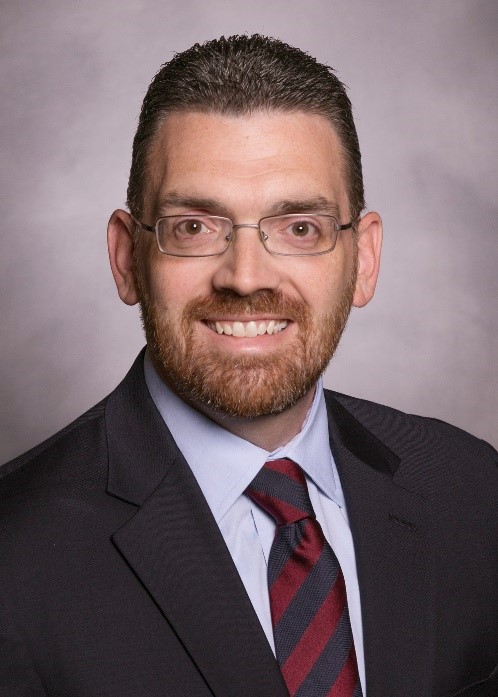JHSPH Alumni Profiles
Dr. Scott Shone, PhD
 Dr. Scott Shone completed his PhD in the Department of Molecular Microbiology and Immunology at the Johns Hopkins Bloomberg School of Public Health in 2005. Upon graduating, Dr. Shone joined the New Jersey Department of Health’s Biothreat Response Laboratory as an Emerging Infectious Diseases Fellow for the Association of Public Health Laboratories and the Centers for Disease Control and Prevention. Dr. Shone worked on a variety of pathogens, including select agents and vector-borne diseases during his fellowship, and eventually accepted a full-time position to stay on as a Research Scientist. Eventually, Dr. Shone was asked to direct New Jersey’s Newborn Screening (NBS) laboratory, a position that Dr. Shone accepted and held for almost ten years. During his time at the helm of NBS, Dr. Shone oversaw the expansion of the list of routinely-screened newborn conditions from 20 to 55. In 2017, Dr. Shone accepted a position as a Senior Research Public Health Analyst at RTI in the Center for Newborn Screening, Ethics, and Disability Studies. In this position, Dr. Shone provides technical assistance, education, and guidance for NBS programs around the country and directs the laboratory for RTI’s voluntary, expanded NBS program, Early Check.
Dr. Scott Shone completed his PhD in the Department of Molecular Microbiology and Immunology at the Johns Hopkins Bloomberg School of Public Health in 2005. Upon graduating, Dr. Shone joined the New Jersey Department of Health’s Biothreat Response Laboratory as an Emerging Infectious Diseases Fellow for the Association of Public Health Laboratories and the Centers for Disease Control and Prevention. Dr. Shone worked on a variety of pathogens, including select agents and vector-borne diseases during his fellowship, and eventually accepted a full-time position to stay on as a Research Scientist. Eventually, Dr. Shone was asked to direct New Jersey’s Newborn Screening (NBS) laboratory, a position that Dr. Shone accepted and held for almost ten years. During his time at the helm of NBS, Dr. Shone oversaw the expansion of the list of routinely-screened newborn conditions from 20 to 55. In 2017, Dr. Shone accepted a position as a Senior Research Public Health Analyst at RTI in the Center for Newborn Screening, Ethics, and Disability Studies. In this position, Dr. Shone provides technical assistance, education, and guidance for NBS programs around the country and directs the laboratory for RTI’s voluntary, expanded NBS program, Early Check.
Jumping into NBS was daunting for Dr. Shone. When he was asked to take on this new role, Dr. Shone didn’t entirely know what the field of NBS even was, let alone how to direct the NBS program for the state of New Jersey. In deciding whether this was a transition he wanted to make, he found that speaking with previous mentors was highly valuable. Through these conversations with the people who believed in him, Dr. Shone realized that although he didn’t yet know everything he needed to, he was equipped with the skills to figure it out. As he sees it, what you learn at Hopkins isn’t limited to the courses you take, the seminars you attend, or a thesis you might complete. Rather, it is about knowing how to think critically about a problem in a logical, stepwise order. Dr. Shone credits these critical thinking skills he developed at JHSPH with helping him transition to his new role in the unchartered realm of NBS; as he put it, “I’m still thinking about things, just different things.” Additionally, Dr. Shone wasn’t shy about connecting with individuals who knew more than him and asking as many questions as it took to fill in his knowledge gaps. Dr. Shone reflects that “the challenges have been learning experiences.”
For Dr. Shone, working at RTI has shared some similarities with his experience in academia. In fact, Dr. Shone describes working at RTI as “quasi-academia,” acknowledging the shared value in both arenas of data-driven decision making, furthering the scientific knowledge-base through publishing, and the fact that both academia and RTI are funded primarily through grants. Dr. Shone found working in the government to be very different from both academia and private-sector work. Since decisions in government are inherently more political, it isn’t necessarily enough to only present data; the challenge lies in demonstrating the benefit of a program in a way that convinces a broader audience.
RTI is a progressive company, and one that values a diverse workforce. RTI has been outspoken in its support for protecting the rights of non-US citizens working in the country. According to the RTI code of conduct, RTI does not evaluate individuals on the basis of their citizenship status. RTI supports H1B Visas for numerous employees at the company.
Dr. Shone transitioned from the New Jersey Department of Health to his current position at RTI looking for a new challenge to stimulate his interest in problem-solving. At RTI, he has certainly found the stimulation he was craving. Dr. Shone describes RTI as an institute full of experts who are smart and passionate about their fields. At RTI, when you don’t know something, there’s undoubtedly someone working down the hall who does, and fascinating conversations inevitably abound. In fact, recently Dr. Shone became involved in an innovative project that seeks to minimize the delay between specimen collection from newborns to samples being delivered to screening laboratories by using novel drone technology. This project, epitomizing RTI, brought together modeling experts, drone experts, states that could benefit from this technology, and experts like himself in NBS in order to brainstorm creative solutions that would overcome the barriers in getting blood specimens to laboratories in a time-efficient way.
Thank you again to Dr. Scott Shone for his time in conducting this informational interview.
This interview was conducted by Julia Pringle, PhD, in collaboration with the Professional Development and Careers Office at the Johns Hopkins School of Medicine.
Current students: if you are interested in connecting with Dr. Shone or other alumni for your own career exploration, please contact: phd_recruit@jhmi.edu.
Alumni: If you are willing to be contacted by a current student for an informational interview to have a profile made about your career path, please contact: phd_recruit@jhmi.edu.
